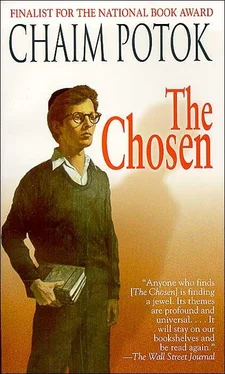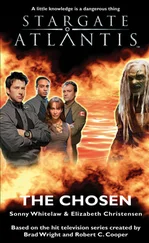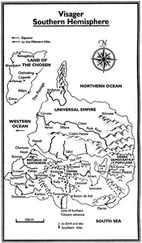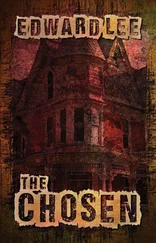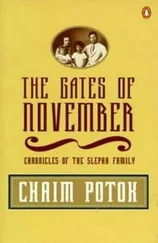'I'm awfully sorry I came back so late, abba.' My father nodded. 'I am not angry,' he said. 'But next time you will be so late, you will call, yes?'
'Yes, abba.'
My father glanced at the clock on the shelf over the refrigerator. 'Reuven, it is late, and tomorrow you are going to school. You should go to sleep now.'
'Yes, abba.'
'Remember, you must not read. I will read to you in the evenings and we will see if we can study that way. But you must not read by yourself.'
'Yes, abba. Good night.'
'Good night, Reuven.'
I left him sitting at the kitchen table over his glass of tea and went to bed. I lay awake a long time before I was able to sleep.
When I got back to school the next morning, I found I had become a hero, and during the fifteen-minute morning recess my friends, and even some boys I did not know, all crowded around me, wanting to know how I was and telling me what a great game I had played. Near the end of the recess, I went over to the pitcher's position and stood on the exact spot where I had been hit by the ball. I looked – tried to look; the yard was crowded with students – at home plate and imagined Danny standing there, grinning at me. I remembered his grinning that way again yesterday, and I closed my eyes for a moment, then went over and stood near the wire fence behind the plate. The bench on which the young rabbi had sat was still there, and I stared at it for a moment. It seemed impossible to me that the ball game had taken place only a week ago. So many things had happened, and everything looked so different.
Sidney Goldberg came over to me and started talking about the game, and then Davey Cantor joined us and added his opinion about those murderers'. I nodded at what they were saying without really listening. It seemed silly to me, the way they kept talking about the game, they both sounded so childish, and I got a little angry when Davey Cantor started talking about 'that snooty Danny Saunders', but I didn't say anything.
I got out of school at two o'clock and took a trolley car over to the public library where I was supposed to meet Danny. The library was a huge, three-story, graystone building, with thick Ionice columns, and with the words BEAUTY IS TRUTH, TRUTH BEAUTY, THAT IS ALL YE KNOW ON EARTH, AND ALL YE NEED TO KNOW – JOHN KEATS engraved in the stone over its four glass entrance doors. It stood on a wide boulevard and there were tall trees in front of it and a grassy lawn bordered by flowers. On the right-hand wall of the vestibule, just inside the doors, there was a mural of the history of great ideas, beginning with a drawing of Moses holding the Ten Commandments, going on to Jesus, Mohammed, Galileo, Luther, Copernicus, Kepler, Newton, and ending with Einstein gazing at the formula E=mc2.
On the other wall there was a mural showing Homer, Dante, Tolstoi, Balzac, and Shakespeare engaged in conversation. They were beautiful murals, done in bright colors, and the great men in them looked alive. Probably because I had become so sensitive about eyes in the past week, I noticed for the first time that Homer's eyes seemed glazed, almost without pupils, as if the artist had been trying to show that he had been blind. I had never noticed that before, and it frightened me a little to see it now.
I went quickly through the first floor, with its marble floors, its marble pillars, its tall bookcases, its long reference tables, its huge windows through which the sun streamed, and its glass topped desks at which the librarians sat. I found Danny on the third floor against the far wall, partly hidden by a bookcase, wearing a black suit, a tieless shirt, and a skullcap. He was sitting at a small table, bent over a book, his long earlocks dangling down the sides of his face and almost reaching to the top of the table.
There were not many people on this floor; its stacks were filled mostly with bound volumes of scholarly journals and pamphlets. It was a large floor, and the closely set stacks gave it a mazelike appearance. They went from floor to ceiling, and. they seemed to me to contain everything of importance that had ever been written on any subject in the world. There were journals in English, French, German, Russian, Italian, and even one collection in Chinese. Some of the English journals had names I couldn't pronounce. This was the one floor of the three-floored library I did not know well. I had been up here once to find an article in the Journal of Symbolic Logic which had been recommended to me by my mathematics teacher, an article which I had only dimly understood, and once to meet my father. Now was the third time in all the years I had belonged to this library that I was on its third floor.
I stood near a bookcase a few feet away from the table at which Danny was sitting, and I watched him read. His elbows were on the table, and he held his head in the palms of his hands, the fingers covering his ears completely, his eyes staring down at the book. Occasionally, the fingers of his right hand would play with his earlock, and once they stroked the tufts of sand-colored hair on his chin for a few seconds, then went back to the side of his face. His mouth was slightly open, and I could not see his eyes; they were hidden by the lids. He seemed impatient each time he came to the foot of a page, and he flipped the page with a quick gesture of his right hand, wetting the forefinger with his tongue and turning the page by pushing upward with the finger against the lower right-hand comer, the way one does a page of Talmud except that with a Talmud the left forefinger usually pushes against the lower left-hand comer because it is read from right to left. He was reading with phenomenal speed. I could see him read. He would start at the head of a page, his head tilted slightly upward, and then his head would move downward in a straight line until he got to the foot of the page. Then it would tilt upward again and either move sideways to the right page or remain fixed in its upward position until the page was turned, and then start downward again. He did not seem to be reading from side to side but up and down, and, watching him, I had the distinct impression that he was reading the middle of the page only and was somehow able to ignore, or absorb without actually reading, what was written on the sides.
I decided not to disturb him, and I sat down at another table a few feet away and continued to watch him read. It was frustrating to be sitting there surrounded by all those journals and not be able to read a thing myself, and I decided after a while to review by heart some of the symbolic logic I had been studying. I closed my eyes and went over the propositional calculus, trying to visualize the truth tables for conjunction, disjunction, equivalence, and material implication. They were fairly simple, and I had no difficulty. I tried to do some problems, but after a while it became complicated, I couldn't remember all the deductive steps, and I stopped. I was about to begin going over the steps of indirect proof when I heard Danny say, 'You're always sleeping! What a sleepyhead you are!' and I opened my eyes. Danny was sitting up in his chair and looking at me.
'I was reviewing my logic,' I told him. 'I wasn't sleeping.'
'Of course,' he said, smiling. But his voice sounded sad.
'I was just going into the indirect proof. Do you want to hear it?'
'No. I can't stand that stuff. Why didn't you tell me you were here?'
'I didn't want to disturb you.'
'You're nice. For a Mimaged.' He gave the Hebrew letter 'tof' its Ashkenazic pronunciation. 'Come over here. I want you to see something.'
I went over to his table and sat down next to him. 'I'm not allowed to read, you know.'
'I want you to hear this. I'll read it to you.'
'What is it?'
'It's from Graetz's History of the Jews.' He sounded unhappy, and there was a somber look on his face. 'It's about Hasidim. Listen. Graetz is talking about Dov Baer, who was the follower of the Besht. He just finished saying that Dov Baer invented the idea of the tzaddik.' He looked down at the book on the table and began to read aloud. '
Читать дальше
